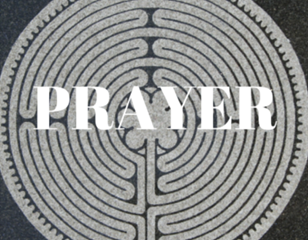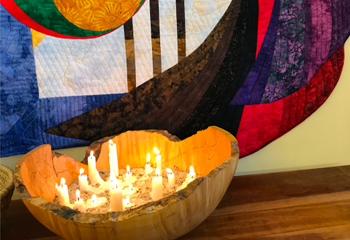Run with the horses
We all deal with teenage angst in different ways. I managed by recording mixtapes from the radio and reading Jeremiah 12 obsessively. The mixtapes—which were, quite literally, tapes, have not survived the test of time, but the Bible has. Jeremiah writes:
“You will be in the right, O God,
when I lay charges against you.
But let me plead my case to you.
What does the way of the wicked prosper?
Why do the treacherous thrive?”
I don’t remember when or how I first learned this passage, only that it was incredibly helpful in navigating high school. Not just Jeremiah’s fruitless petition against the forces of the universe, but also God’s response to Jeremiah, which Dan read for us this morning:
“If
you have raced with foot-runners and they have wearied you,
how will you compete with horses?
And if in a safe land you fall down,
how will you fare in the thickets of the Jordan?
6 For even your kinsfolk and your own family,
even they have dealt treacherously with you;
they are in full cry after you;
do not believe them,
though they speak friendly words to you.”
This passage may be familiar from last week’s call to worship. I’ve continued to hold it this week. As a teenager, it was so validating to watch a young Jeremiah, only a couple of years into his prophetic vocation of raging against the machine, get fed up and rage against God. God’s response was equally comforting to me. It can be read as a “tough love” response, God’s call to buck up and view pain as gain. But that’s not what I heard in it. What I heard was a wide and daring affirmation, akin to Marianne Williamson’s insistence that what we are most afraid of is not our weakness, but our own power. I heard the words of A.A. Milne in Winne the Pooh,
“You are braver than you believe,
stronger than you seem,
and smarter than you think.”
Perhaps this was because I had a fervent and extended period of horse obsession as a child, but that’s neither here nor there.
In 6th grade, before the prophet Jeremiah became to me what Fallout Boy was to my peers, I realized that the conservative Christian school I’d attended since kindergarten was no longer working for me, and I left for the strange and magical world of public school. One of the last lessons I remember before leaving was taping a piece of paper to the bottom of a desk and lying on the floor to draw on it, to replicate Michelangelo’s experience painting the Sistine Chapel.
A slightly more useful lesson, around the same time, was one of my final Bible classes, in which we had to look up every king in Israel and Judah by and write down whether they were bad or good. The list for Judah looked like this:
bad
bad
bad
bad
bad
bad
good
bad
bad
bad
good
bad
bad
good
bad
good
bad
bad
The list for Israel was just Bad all the way down.
This memory proved surprisingly useful in seminary and comforting in the election cycles I’ve witnessed since 1998. But this is also a very long way of saying this is why I believe Joe Biden can win. Goodness is governance is not linear, nor is badness. We may be living in a declining nation state, as Jeremiah did, as all the prophets of Judah and Israel did, but decline is not linear. It moves in two steps forward and one step back, and it takes generations to collapse. Several years ago, I listened to a podcast called The Fall of Rome, a historical analysis of the Roman Empire’s collapse, and again felt the depressing hope buoy me that the collapse of an empire, seen from the inside, tends to look slow and natural and full of small lifestyle adjustments over time. Milennials did not become who they were when they graduated into the economy; we were always this way. We knew, from a very young age that we would be the first generation on this land in 250 years to be worse off than our parents. We’ve been adjusting for a lifetime.
From a very young age, I assured myself that there was a good chance the nation would not collapse in my lifetime. But if it did, I, like Jeremiah, would race with the horses.
Yesterday, I called Joe and Betsy and asked them a question. There was a long pause while they thought and finally Joe said, “It’s hard to think the day after Ruth Bader Ginsberg dies.”
It seemed to sum up the whole week. It is hard to think right now.
We are still soaked in outrage fatigue from last year, and this year was already ten years long. We are, physiologically, exhausted from running on almost four years of flight-or-fight hormone response.
And we are not the only ones. So is the prophet Elijah. Elijah lived in one of those “bad bad bad bad bad” eras of governance, and his encounters with King Ahab and Queen Jezebel, the rulers at the time of this morning’s story, were Very Bad. Even before the drought, Elijah had a few near-death encounters with the ruler.
Elijah is a prophet, which means he is an activist. Which means he spends a lot of time thinking about how the nation is going downhill, and telling everybody else to get their act together and create a social safety net, and everybody else spends a lot of time telling him to go to hell. In today’s story, freelance speaker, activist, and national personality Elijah delivers bad news to King Ahab, who is already his sworn enemy, and then God tells him to go out into the wilderness and Elijah lingers there, drinking from the stream and eating what the ravens bring. He has raced with foot-runners, and he is exhausted.
When the river runs dry, he walks to Zaraepeth, where he meets this widow. Elijah is still exhausted, even after being alone. He knows the nation is falling apart, the leaders are narcissistic brutes who will tear gas for photo ops and sterilize prisoners. The curtain has been lifted and he sees behind it—but he cannot change it, not the way he needs to.
And yet he finds himself in a position to help an impoverished woman and her starving son. He doesn’t bring them abundance, he doesn’t restore them to the middle class, he just ensures that they have enough for one more day, and one more day after that, and another day after that until the rains come. Almost like the scene at the beginning of The Hunger Games, where Katniss is scrounging back alleys for a last meal for her widowed mother and baby sister, and Peeta tosses a loaf of deliberately burnt bread to her.
We can be exhausted, sometimes, seeing behind the curtain of our system, realizing that we have enough wealth to feed and house everyone, and we can be paralyzed about where to start undoing the system. We can feel the urge to focus on big and powerful solutions and resist the daily encounters that give us opportunities to respond: the panhandler on the street, the family coming to the food pantry. We need big, systemic responses.
But even when that is not possible—and it may be less and less possible if, truly, our nation-state is in decline—we, like Elijah, are called to ensure there is at least enough for tomorrow. We don’t have to restore our neighbors’ fortunes. But as often as we are in a position to make tomorrow better, we must do so.
We can be are outraged and exhausted and grieving. And we, like Peeta Mellark in The Hunger Games, still live in the baker’s house and have enough bread to eat and sell—and to give away.
You, like Elijah, are not in the position to depose the king. But you are in the position to make sure a widow can eat tomorrow. Just for tomorrow.
If you’ve been immersed in grief all weekend, that’s physiologically where your body needs to be. If you are outraged, feel all of those difficult feelings. Let your body collapse and cry and shake. It is not bad or wrong to stumble in the face of so much pain. I wonder sometimes what these four years will do to us, physically, how we will carry these years of extended stress. We are still learning to navigate a callous, self-absorbed president—it feels like he’s been here forever, but the body takes time to process information, much more time than it seems.
It is important that we continue to let our bodies grieve, to feel the heavy feelings of being human. And it is important to attune ourselves to kindness, to center ourselves, to welcome strange women who arrive at your door to pour soft, soothing oil over your feet when you are staring down death, just as Jesus did when he was anointed at Bethany. Naming beautiful things in the middle of pain is not disrespectful, it is what keeps us human.
If you drive west on I-90 from here, eventually you’ll reach the arid Washington State desert. If you keep driving, halfway between Ellensburg and Othello, which is exactly where you think it is, that is, you have no idea and the landscape is bleeding together in a run of brown and scrubby green brush, there is an enormous sculpture of 15 life-sized horses running across a ridge above the Colombia River. It was installed in 1989, which means as long as I’ve been able to look at the window on I-90, it’s been in view. The sculpture is called Grandfather Cuts Loose the Ponies, an allusion to the connection between First Nations’ communities and horses.
Even after I’d seen the sculpture a half-dozen times, I still gave a start when it came into view, the way the horses look so lifelike from the highway, and about to run off the edge of the cliff.
Years and years of driving past that sculpture, and of reading Jeremiah, subconsciously ingrained in me what public art is supposed to ingrain, what poetry is supposed to ingrain: I have not yet raced with horses. I have raced with foot-runners—and lost. But I know, when things get worse, my God will ask me to get out of the car and run with the horses. And I may be terrified. But I will be ready.
We do not keep going because it gets better, we keep going because it gets harder, and God goes with us into the hard spaces. This injustice isn’t going to undo itself. It’s you, me, and a God who whispers,
You are braver than you believe,
stronger than you seem,
and smarter than you think.
You can run with the horses.


0 Comments